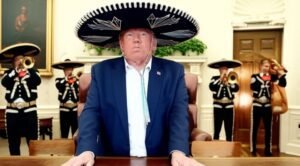How old is the “F’ word, the one all of us think of when the initial “F” is mysteriously floated? The other evening I was watching a TV series set in the 18th Century, and the head of the East India Company kept repeating “F—” this and “F—” that.
Anyway, that’s neither here nor there. The “F” word I’m referring to is the one that his critics accuse President Trump of — FASCISM!
PLAY THE AUDIO BY PUSHING BUTTON BELOW
Here I’m not talking about gas chambers, the burning of books, or the rounding up of people in the middle of the night — oops, that last one may actually be happening if critics are to be believed.
I’m referring to Fascism and Nazism and the control of the economy.
Hitler was more than happy to let private individuals and corporations own the means of production — so long as he and the State had control over these companies.
With the recent announcement that the U.S. is taking a 10-percent stake in Intel, I can see the creepy little feet of Fascism marching into the economy. Intel, of course, is a storied chipmaker, whose chips are essential to almost every aspect of the economy, especially national security.
Now, this transaction was a bit different than Fascism in that it was a direct investment with no strings attached.
Wait, what about the fine print? There are invariably strings of government control, real and looming, incumbent upon government involvement.
Walter Isaacson, Tulane University professor, assessed the situation in an “F” perspective when being interviewed on CNBC. He observed:
“You’re seeing what is really state capitalism here, where the government is interfering in all sorts of ways in corporate decisions, whether it be pricing, whether it be Coca Cola (KO), whether it be Intel (INTC) and taking maybe taking a stake in it.”
Bottom line, in terms of economics Trump may have more in common with the “Democratic socialist” Zohran Mamdani than he or his supporters would ever care to admit.







